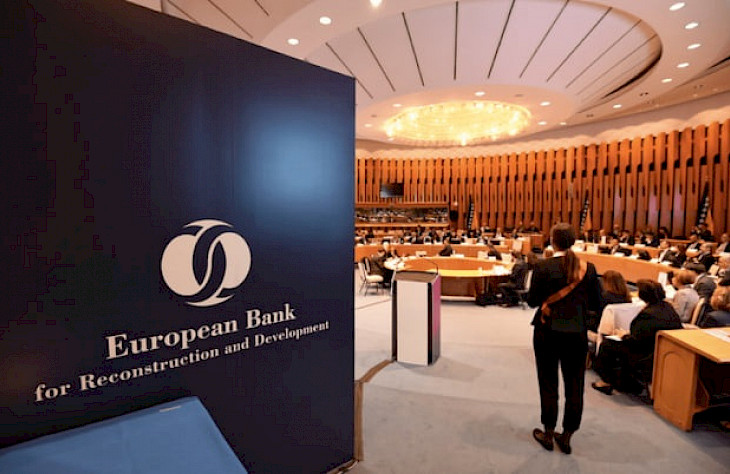The European Bank for Reconstruction and Development (EBRD) has been operating in the Kyrgyz Republic since 1992, marking more than 30 years of engagement. With over €1bn invested in over 250 projects across various sectors, the EBRD has become a key player in the country’s economic development. The Bank’s efforts in Kyrgyzstan span private sector development, infrastructure improvement, green energy transition, and fostering sustainable economic growth, Times of Central Asia reports.

EBRD’s Mission and Strategy in Kyrgyzstan
The EBRD operates in Kyrgyzstan with the aim of fostering private sector growth and enhancing competitiveness, aligning its activities with the country’s broader development goals. This is guided by a country strategy that is jointly developed with local stakeholders and approved by the EBRD’s Board of Directors. The latest iteration of this strategy, approved in 2023, outlines the Bank’s priorities for the next five years, focusing on three major areas:
Private Sector Development and Competitiveness: Strengthening the private sector is central to Kyrgyzstan’s economic future. The EBRD supports small businesses and startups through financial and advisory programs. This includes risk-sharing networks that assist local businesses in improving their productivity and market relevance.
Green Economic Transition: A vital part of the strategy emphasizes the transition to a greener economy, particularly decarbonization and energy efficiency. Kyrgyzstan, like many countries in Central Asia, is dealing with the consequences of regional water scarcity and climate change, which makes sustainable water management a top priority for the EBRD.
Improved Connectivity: The EBRD is working to enhance Kyrgyzstan’s infrastructure to boost regional and global connectivity. The Bank’s investments in road infrastructure, digital connectivity, and energy networks are designed to foster regional integration and increase foreign investment.
Water Infrastructure Modernization and Sustainable Development
Water management remains a key issue for Kyrgyzstan and the wider Central Asian region. The region, facing increasing water stress due to climate change, has aging infrastructure that needs substantial investment to modernize. Kyrgyzstan, in particular, is projected to face significant water scarcity by 2040, making sustainable water management even more crucial.
The EBRD is addressing this challenge with several ongoing projects, including the modernization of water infrastructure in three cities in Kyrgyzstan. These projects are part of broader regional efforts to tackle water insecurity in Central Asia. By collaborating with the Ministry of Finance, the EBRD has facilitated sovereign lending agreements aimed at modernizing water networks. This investment is vital to improving resource efficiency and water supply, which will help ensure long-term sustainability.
Alongside financial support, the EBRD provides advisory services on climate risk management and governance, which are essential in addressing the region’s water management challenges. The Bank’s initiatives also focus on integrating climate resilience into infrastructure projects, ensuring that water systems are more adaptable to the impacts of climate change.
Supporting Innovation and Startups in Kyrgyzstan
The EBRD has a clear focus on promoting innovation and supporting the startup ecosystem in Kyrgyzstan. One of the Bank's flagship programs, Star Venture, offers targeted support to promising startups, providing advisory training, strategic guidance, and workshops. The program is designed to help these businesses secure funding and scale their operations.
Additionally, the EBRD runs initiatives like Women in Business (WiB) and Youth in Business (YiB), which support small and medium-sized enterprises (SMEs) owned and managed by women and youth. These programs are essential in promoting inclusion and innovation in the Kyrgyz business ecosystem, helping entrepreneurs grow their businesses and contribute to the country’s economic development.
EBRD’s Approach to Water Efficiency and Agricultural Infrastructure
In addition to urban water projects, the EBRD is also involved in agricultural infrastructure improvements, particularly in water-efficient farming techniques. Projects such as drip irrigation and hydroponic agriculture are critical in addressing the water scarcity challenges that impact agricultural productivity in Kyrgyzstan and the broader region. The Bank works with local farmers to implement modern agricultural techniques that conserve water while improving crop yields.
Through its partnerships with local banks, the EBRD also offers financial products tailored to the agribusiness sector, further supporting the modernization of Kyrgyzstan’s agriculture.
Collaboration with China’s Belt and Road Initiative (BRI)
The EBRD recognizes the importance of regional connectivity, and this is reflected in its approach to transport infrastructure. The Bank is actively involved in initiatives aimed at improving East-West transport corridors, which are crucial for Kyrgyzstan’s economic integration into global markets. This includes collaboration on the Belt and Road Initiative (BRI), which is aimed at improving transport infrastructure across Central Asia.
The EBRD has conducted extensive studies on sustainable transport corridors that link Central Asia with Europe and China, identifying the necessary infrastructure investments to make these connections more efficient and sustainable. These efforts align with the broader regional goals of increasing trade, boosting economic activity, and improving export capacity.
Looking ahead, Kyrgyzstan’s economic development is expected to focus on several key sectors, including renewable energy, tourism, and natural resources. The Kambarata HPP (Hydroelectric Power Plant) is a significant project that will play a central role in the country’s energy security and regional integration. Renewable energy projects, including hydro, solar, and wind, will be crucial to reducing Kyrgyzstan’s dependence on fossil fuels and enhancing its energy independence.
The tourism sector, particularly in the Issyk-Kul region, is also expected to thrive in the coming years, given its natural beauty and increasing interest from international visitors. The EBRD is supporting sustainable tourism development by financing water and infrastructure projects that will help preserve the region's environment while promoting tourism growth.
Finally, the mining sector is set to grow, with the government focused on further developing its natural resources to generate foreign currency revenues. The EBRD is working with the Kyrgyz government to improve the investment climate and support private sector development in these key areas.
Comments (0)